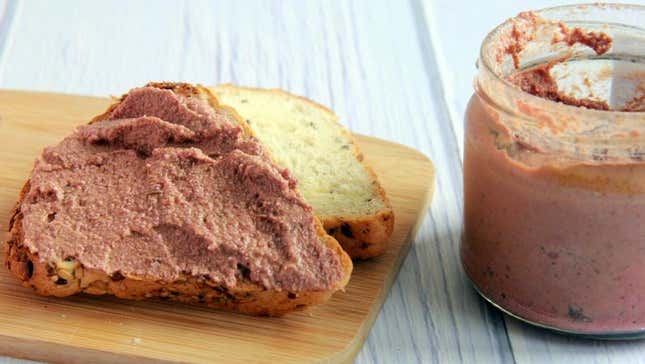
The craze behind plant-based beef alternatives might be fading, but that doesn’t mean vegan meat substitutes are going away. Tofurky has been around forever, jackfruit burgers are gaining steam, and for the upper-class vegans out there, a new trend is on the rise: meatless foie gras. Or “faux gras,” as it’s come to be known. (This seems like one of those things where they came up with the name before they came up with the product, like gorp, or borgs, or the USA PATRIOT Act.) So, what’s in fake foie gras?
For those not in the Kardashians’ tax bracket, let’s first discuss what foie gras is in the first place. Britannica explains that foie gras is the liver of a duck or goose; the animal is force-fed through a tube in order to produce an extra fatty liver. In fact, that’s literally what “foie gras” means in French. If you’ve never tasted it, you’ve probably at least heard the complaints from PETA.
Given the controversy surrounding the French delicacy, it’s easy to wonder why vegans would even have interest in seeking a plant-based alternative. Parisian chef Fabien Borgel, who created a faux gras for his vegan restaurant, 42 Degrés, thinks some vegans may not even know they want it.
“You have people that have never tasted foie gras and will never taste it and they want something festive for the year-end parties,” Borgel told Reuters. His creation is made of cashews, sunflower oil, and coconut oil, so it’s certainly not lacking in fat. In fact, it’s allegedly even creamier than the original.
Vegans, it turns out, might not even be the target audience. Last December, a large outbreak of bird flu made the already scarce specialty even scarcer. Per Reuters, France’s foie gras output fell around 30%, leaving room for alternative solutions.
Around that same time, a Spanish company launched a grocery store faux gras that proved to be a hit. The founder of Hello Plant Foods told The Guardian that the product, called Fuah!, sold over 30,000 units in just a few weeks. Like Borgel’s version, Fuah! is made from cashews, coconut oil, and sunflower oil, as well as a range of spices. It also comes in spreadable and sliceable varieties.
Nestlé even has a vegan foie gras alternative that it’s looking to launch worldwide after a successful test run in Europe. Called Voie Gras, Nestlé’s take is made with soy, miso, and truffle, so it sounds like it has a bit of a different flavor profile than Fuah! and other similar products.
Vegan cooking website Bosh! (what’s with all the exclamation points?) has a faux gras recipe based on walnuts, lentils, mushrooms, and “plant-based butter.” I am not vegan, but I would certainly consider making this. Do I care about the well-being of animals? Not really. Do I care about giving off an aura of aristocracy to my dinner guests? Absolutely.